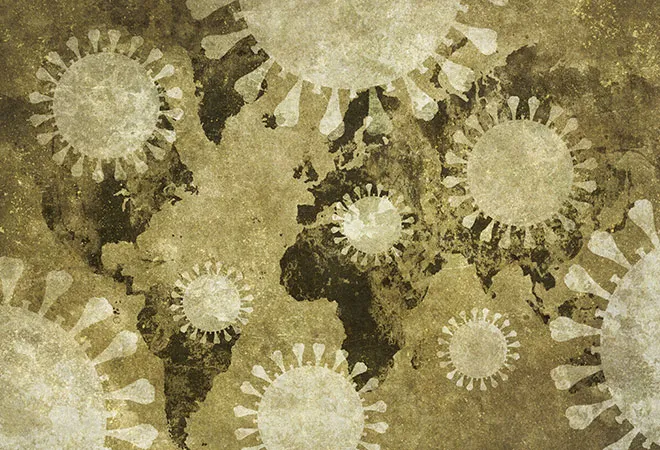-
CENTRES
Progammes & Centres
Location
 Whether Covid-19 is the biggest crisis of this century can hardly be concluded yet, there is no doubt that it will critically affect many aspects of our present ‘drifting in the current’ existence. For the last few decades we uncritically accepted a number of things: large segments of the populations the world over had taken for granted the enormous power that globalization had given us in purchasing things made elsewhere, in going around the world for business or travel with unimaginable frequency and speed, in having larger and larger airplanes and airports, more and more comfortable hotels to stay in, more and more powerful machines and modes of communication to spread our normal or abnormal thoughts and disastrous lies, and more social distancing with our near ones.
We thought that our right to destroy Nature was boundless. We were taking pride in lifting more people from poverty although shamelessly enhancing inequalities. We assumed that we could only go forward in enjoying all the benefits that globalization had given us. The HIV health crisis which threatened us in the early years of globalization was behind us. Environmental crisis, global warming and climate change required occasional lip service and no resolve to cut down the comforts of globalization for a meaningful response to these crises were visible. Our appetite for consumption lost all limits. Gandhi is credited to have said that we are entitled to take from the world only that much that we need and not more so that the usufruct rights of later generations are preserved undamaged, but that was passé.
Covid-19 has brought us face-to-face with the underbelly of globalization. We are realizing the problems of global chain production, seamless connectivity, dependence on others even for strategic and life saving materials, selfish and irresponsible politicians, weakness of regional bodies including the EU, lack of global leadership. Global lockdown, unheard of in past crises of a similar nature, has become indispensable today as the level of present connectivity, domestic and global, was also unknown in the past.
But ironically, the crisis produced by Covid-19 also, and at the same time, reminds us of the need for global co-operation, the impossibility of erecting impenetrable border walls, international interdependence and regional co-operation, open and democratic political societies, humane approach to global issues and responsible and morally competent global leadership. Above all, it reminds us of the continuing importance of responsibly nurturing global organizations like the UN and the WHO.
In India till now it looks like we have not done too badly although the near future is yet to be seen. Perhaps, lockdown decision could have been made earlier or international and domestic flights could have been grounded much before. Stoppage of trains has taken place more appropriately though much of these have happened under pressure from several state governments. Responsibility at the level of both centre and states show the resilience of the federal structure in India.
In a sense, this crisis is God’s (if you are a believer) or Nature’s way of teaching lessons. Our scientific and technological discoveries of recent times have overtaken our souls. We forget the meaning and purpose of life and focus on consuming and enjoying whatever we can lay our hands on.
Whether Covid-19 is the biggest crisis of this century can hardly be concluded yet, there is no doubt that it will critically affect many aspects of our present ‘drifting in the current’ existence. For the last few decades we uncritically accepted a number of things: large segments of the populations the world over had taken for granted the enormous power that globalization had given us in purchasing things made elsewhere, in going around the world for business or travel with unimaginable frequency and speed, in having larger and larger airplanes and airports, more and more comfortable hotels to stay in, more and more powerful machines and modes of communication to spread our normal or abnormal thoughts and disastrous lies, and more social distancing with our near ones.
We thought that our right to destroy Nature was boundless. We were taking pride in lifting more people from poverty although shamelessly enhancing inequalities. We assumed that we could only go forward in enjoying all the benefits that globalization had given us. The HIV health crisis which threatened us in the early years of globalization was behind us. Environmental crisis, global warming and climate change required occasional lip service and no resolve to cut down the comforts of globalization for a meaningful response to these crises were visible. Our appetite for consumption lost all limits. Gandhi is credited to have said that we are entitled to take from the world only that much that we need and not more so that the usufruct rights of later generations are preserved undamaged, but that was passé.
Covid-19 has brought us face-to-face with the underbelly of globalization. We are realizing the problems of global chain production, seamless connectivity, dependence on others even for strategic and life saving materials, selfish and irresponsible politicians, weakness of regional bodies including the EU, lack of global leadership. Global lockdown, unheard of in past crises of a similar nature, has become indispensable today as the level of present connectivity, domestic and global, was also unknown in the past.
But ironically, the crisis produced by Covid-19 also, and at the same time, reminds us of the need for global co-operation, the impossibility of erecting impenetrable border walls, international interdependence and regional co-operation, open and democratic political societies, humane approach to global issues and responsible and morally competent global leadership. Above all, it reminds us of the continuing importance of responsibly nurturing global organizations like the UN and the WHO.
In India till now it looks like we have not done too badly although the near future is yet to be seen. Perhaps, lockdown decision could have been made earlier or international and domestic flights could have been grounded much before. Stoppage of trains has taken place more appropriately though much of these have happened under pressure from several state governments. Responsibility at the level of both centre and states show the resilience of the federal structure in India.
In a sense, this crisis is God’s (if you are a believer) or Nature’s way of teaching lessons. Our scientific and technological discoveries of recent times have overtaken our souls. We forget the meaning and purpose of life and focus on consuming and enjoying whatever we can lay our hands on.
But this is a moral way of speaking. Not irrelevant of course; but neither is it very central to our modern globalized outlook. That outlook will take a beating for now, but it will not disappear. Thinking more realistically, it can be argued that great power competition will continue, if not become harsher, in the post-Covid-19 world. Similarly, global capitalism will find new ways of pushing global production chains with some amends here and there. Channels of connectivity like the Belt and Road may go through explicit sanitization procedures to show that they do not carry Covid-19 like viruses. At the same time, nationalism, while admitting the inevitability of global capitalism, will find new, and not necessarily loftier, ways of resurrecting itself. Migrations of peoples and viruses will continue, though the former will be resisted more forcefully (and more successfully) than the latter. Creative brains may even argue that an ethnically undiluted people will have greater resistance to the viruses. Economic cost of the crisis will be passed on to the lower rungs of societies. Democracies and open societies could be facing similar challenges as they are doing now. Once China recovers well, the fact that democracies like South Korea or Taiwan better managed the virus than an authoritarian China will become dim or jaded in our memory and centralizing forces could become forceful again in many places including India.However much we may be concerned with the mortal threat of Covid-19 now, once an effective vaccine is discovered, much of it will be forgotten and the world will move on much like it is doing now though, maybe, with a substantially less population. And lesson learnt would sooner be forgotten by most. This is the tragedy of human existence, or perhaps, its only consolation.
The views expressed above belong to the author(s). ORF research and analyses now available on Telegram! Click here to access our curated content — blogs, longforms and interviews.

Professor in Political Science, Calcutta University (Retired 2008). Formerly Dean, Faculty of Arts, Calcutta University; Visiting Fellow in Political Science and Associate, Committee on South ...
Read More +
Samantha Keen Researcher Strengthening National Climate Policy Implementation (SNAPFI) project University of Cape Town South Africa
Read More +